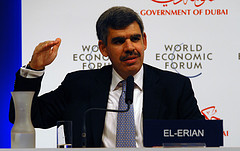Though the market has sold off sharply since the election, the S&P 500 remains up over 9% for the year, and a ten-year chart shows the powerful rally since the financial crisis hasn’t really broken down.
Yet, while the market as measured by the S&P 500 has fully doubled its value since that mid-March 2009 trough, individual investors still don’t seem to care all that much about stocks. More disturbingly, Americans increasingly don’t care about financial planning at all.
You’ve probably seen some data on falling market trading volume, the recent rush out of stocks and into bonds, and the observed flight of the Mom & Pop investor. Now here’s some quantitative data from the great window on the contemporary collective psyche. Google publishes two indexes – the Google Investing Index and the Google Financial Planning Index – that track search query volume for keywords associated with each topic. The Investing Index currently sits near a nine-year low:
This chart overlays the performance of the S&P 500 in red on the Google Investing Index in blue (click to enlarge):
That widening gap since mid-2009 illustrates the remarkable public apathy toward the stock market, despite its strong gains. The blip upward in August 2011 was an expression of concern amid the downgrade of US debt and the market’s subsequent 20% drop. Since the crisis, it seems people have cared about stocks only when they fell sharply. (It’s important to note that the Google Investing Index does not include queries related to fixed income: “bonds” “dividends” and so on.)
Now here’s the Google Financial Planning Index, which tracks queries related to “401k, ira, fidelity, roth 401k, prudential retirement” and the like:
So it’s not just stocks that have lost the public’s attention – it’s anything to do with their financial planning. These days, people just don’t want to think about the market, their investments or funding their retirement.
That may be troubling from a national perspective, but if you’re an individual observing this data, it’s probably a bullish point, especially for stocks. Historically, the best times to invest in the market have been when everyone else has completely lost interest in stocks.
Photo: ema_poops





